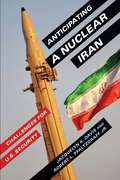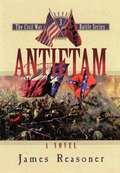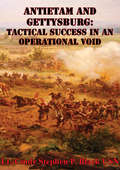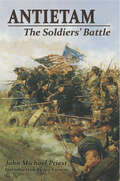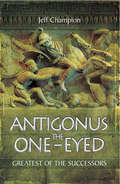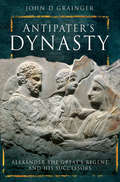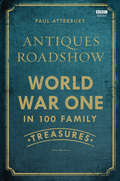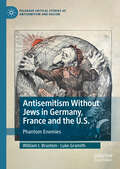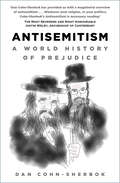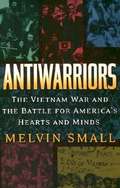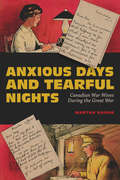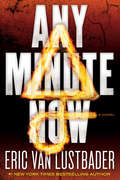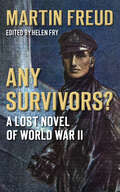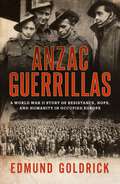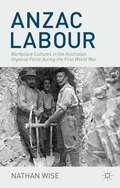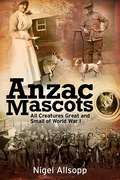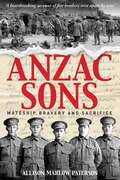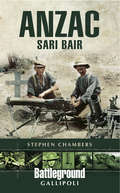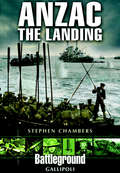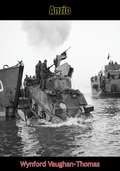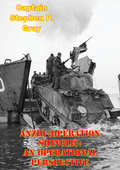- Table View
- List View
Anticipating a Nuclear Iran: Challenges for U.S. Security
by Jacquelyn Davis Robert Pfaltzgraff Jr.This volume is based on the assumption that Iran will soon obtain nuclear weapons, and Jacquelyn K. Davis and Robert L. Pfaltzgraff Jr. develop alternative models for assessing the challenges of a nuclear Iran for U.S. security. Through three scenario models, the book explores the political, strategic, and operational challenges facing the United States in a post–Cold War world. <P><P>The authors concentrate on the type of nuclear capability Iran might develop; the conditions under which Iran might resort to threatened or actual weapons use; the extent to which Iran's military strategy and declaratory policy might embolden Iran and its proxies to pursue more aggressive policies in the region and vis-à-vis the United States; and Iran's ability to transfer nuclear materials to others within and outside the region, possibly sparking a nuclear cascade. Drawing on recent post–Cold War deterrence theory, the authors consider Iran's nuclear ambitions as they relate to its foreign policy objectives, domestic politics, and role in the Islamic world, and they suggest specific approaches to improve U.S. defense and deterrence planning.
Antietam (The Civil War Battle Series, Book #3)
by James Reasoner[From the back cover] Will glanced at the cornfield to his right and saw the hail of bullets cutting through the growth, knocking ears of corn from their stalks and making the plants sway as if a wind were blowing over them. It was a wind of death, thought Will, and that was all he had time to think before the Federals were upon them. He emptied his pistol at almost point-blank range as the leading edge of the Union attack reached the trees. Around him, the men of his company could hold back no longer. With Rebel yells sounding from their throats, they leaped forward, firing their rifles, thrusting with bayonets, slashing with rifle butts. The two sides came together with an audible crash. Grunts of exertion mingled with shrieks of pain. Men who tripped and fell were trampled ruthlessly underfoot by friend and foe alike. Will pulled his saber from its scabbard. His training in its use had been rudimentary at best, but he knew how to hack back and forth with the blade. As he fought, his senses alternated between a heightened awareness and a dull numbness. There were moments that were crystal clear, etched in his memory for the rest of his life: the open, shouting mouth of a Union soldier lunging at him, the bitter stench of powder smoke in his nose, the burning pain of a bullet that grazed his left shoulder and tore his uniform but left only a red mark on his flesh. At other times he seemed surrounded by a fog that pressed in on him so that the figures around him were blurry and the sounds of battle only a distant din. But always he fought, striking out at anyone in a blue uniform. Something brushed his face, and he realized it was a corn tassel. He had stumbled into the field without knowing it. All around him the plants were falling, some of the stalks cut down by flying bullets, others toppled by the bodies of men as they fell, the wounded, the dead, and the dying. Green was splashed with crimson and then crushed into the earth.
Antietam And Gettysburg: Tactical Success In An Operational Void
by Lt.-Cmdr Stephen P. Black USNThe Battles of Antietam and Gettysburg are widely recognized as tactical victories for the Union's Army of the Potomac. Following both battles, however, the respective commanding generals. General McClellan and General Meade, were sharply criticized for having failed to vigorously pursue General Lee and his Army of Northern Virginia in order to deliver a decisive blow. Both Union commanders offered a list of extenuating circumstances, such as battle fatigue, large casualties and lack of supplies, which precluded a "premature" pursuit of General Lee.Upon examination, however, their inability to conceptualize a decisive pursuit of General Lee's army points to a direct failure at the operational level of War. Both Union generals were unable to link their tactical victories to any larger strategic objective. The reasons for this from the strategic confusion of a conflict evolving from limited War to total War, and from the void in operational training that left both McClellan and Meade ill prepared to perform successfully at this critical level of Warfare.Examining this operational void, it becomes apparent that a commander's construct of War must be complete, that is, fully cognizant of the strategic, operational and tactical levels of War, in order to achieve success beyond the limits of the tactical battlefield. Such an examination points to the criticality of the operational level of Warfare, highlights the importance of the commander's concept of operations and suggests that an operational commander must grow in the sense that his cognitive processes must be tuned into the dynamics of his environment, not only on a tactical level, but on the operational and strategic level.
Antietam: The Soldiers' Battle
by Jay Luvaas John Michael Priest“The best battlefield first-person compilation I have read . . . Here it all is—the tactics, the movement, the truth about warfare.” —The Civil War TimesIn Antietam: The Soldiers’ Battle, historian John Michael Priest tells this brutal tale of slaughter from an entirely new point of view: that of the common enlisted man. Concentrating on the days of actual battle—September 16, 17, and 18, 1862—Priest vividly brings to life the fear, the horror, and the profound courage that soldiers displayed, from the first Federal cavalry probe of the Confederate lines to the last skirmish on the streets of Sharpsburg. Antietam is not a book about generals and their grand strategies, but rather concerns men such as the Pennsylvanian corporal who lied to receive the Medal of Honor; the Virginian who lay unattended on the battlefield through most of the second day of fighting, his arm shattered from a Union artillery shell; the Confederate surgeon who wrote to the sweetheart he left behind enemy lines in Harrisburg, Pennsylvania that he had seen so much death and suffering that his “head had whitened and my very soul turned to stone.”Besides being a gripping tale charged with the immediacy of firsthand accounts of the fighting, Antietam also dispels many misconceptions long held by historians and Civil War buffs alike. Seventy-two detailed maps—which describe the battle in the hourly and quarter-hourly formats established by the Cope Maps of 1904—together with rarely-seen photographs and his own intimate knowledge of the Antietam terrain, allow Priest to offer a substantially new interpretation of what actually happened.
Antigonus the One-Eyed: Greatest of the Successors
by Jeff ChampionThe author of Pyrrhus of Epirus &“tells the exciting story of one of those competing to succeed Alexander the Great . . . Recommended.&” —Firetrench Plutarch described Antigonus the One Eyed (382-301 BC) as &“the oldest and greatest of Alexander&’s successors.&” Antigonus loyally served both Philip II and Alexander the Great as they converted his native Macedonia into an empire stretching from India to Greece. After Alexander&’s death, Antigonus, then governor of the obscure province of Phrygia, seemed one of the least likely of his commanders to seize the dead king&’s inheritance. Yet within eight years of the king&’s passing, through a combination of military skill and political shrewdness, he had conquered the Asian portion of the empire. Antigonus&’ success caused those who controlled the European and Egyptian parts of the empire to unite against him. For another fourteen years he would wage war against a coalition of the other Successors, Ptolemy, Lysimachus, Seleucus and Cassander. In 301 he would meet defeat and death in the Battle of Ipsus. The ancient writers saw Antigonus&’ life as a cautionary tale about the dangers of hubris and vaulting ambition. Despite his apparent defeat, his descendants would continue to rule as kings and create a dynasty that would rule Macedonia for over a century. Jeff Champion narrates the career of this titanic figure with the focus squarely on the military aspects. &“It is far time that we have a biography of one of the greatest men of Hellenistic society . . . His rise from this backwater to almost becoming the king of the entire Macedonian empire is detailed by the author.&”—A Wargamers Needful Things.
Antipater's Dynasty: Alexander the Great's Regent and his Successors
by John D. Grainger&“A compelling review of Antipater and his family . . . A gripping story of a real game of thrones&” from the author of the Seleukid Empire trilogy (Firetrench). Antipater was a key figure in the rise of Macedon under Philip II and instrumental in the succession of Alexander III (the Great). Alexander entrusted Antipater with ruling Macedon in his long absence and he defeated the Spartans in 331 BC. After Alexander&’s death he crushed a Greek uprising and became regent of the co-kings, Alexander&’s mentally impaired half-brother (Philip III Arrhideus) and infant son (Alexander IV). He brokered a settlement between the contending Successors but died in 319 BC, having first appointed Polyperchon to succeed as regent in preference to his own sons. Antipater&’s eldest son Cassander later became regent of Macedon but eventually had Alexander IV killed and made himself king. Three of his sons in turn briefly succeeded him but could not retain the throne. Antipater&’s female heirs are shown to be just as important, both as pawns and surprisingly independent players in this Macedonian game of thrones. The saga ends with the failed bid by Nikaia, the widow of Antipater&’s great grandson Alexander of Corinth, to become independent ruler of Macedon. &“A great book by a great author on one of the most important of the Diadochi.&” —A Wargamers Needful Things
Antiques Roadshow: World War I in 100 Family Treasures
by Paul AtterburyTo mark the centenary of the start of World War I, the Antiques Roadshow team filmed a series of specials at the Somme, where the public brought in their family's war memorabilia and photographs. These 'antiques' weren't financially valuable, or in some cases even very beautiful, but the stories that came attached to these momentoes were priceless. Antiques Roadshow: World War I in 100 Family Treasures takes 100 of the most fascinating and moving stories and shows how they fit in to the wider history that was occuring around them. From Rifleman Frank Edwards, who led the 'big push' in September 1915 kicking a football in front of the troops (and survived to tell the tale) to the formidable Catherine Murray Roy, one of the first 50 nurses to be sent to the front lines in France. The story behind each object paints an intimate portrait of a long-lost relative, and quotes from the modern-day participants in the roadshow provide a moving link between the families then and now. Fully illustrated, and featuring all the stories from the show, this is a truly unique way of telling the story of those ordinary lives that were, by the onset of war in 1914, thrown into the most extraordinary of circumstances.
Antisemitism Without Jews in Germany, France and the U.S.: Phantom Enemies (Palgrave Critical Studies of Antisemitism and Racism)
by William I. Brustein Luke GramithWhy does antisemitic messaging strike a chord in certain communities without Jews but fall flat in neighboring communities equally without Jews? This book focuses on antipathy towards Jews - expressed through successful electoral campaigns where a candidate or political party championed antisemitism - in communities located in three different nations where the Jewish population had virtually no history of interaction with the resident majority population of non-Jews. The cases are: the election of antisemitic deputies in the 1893 German Reichstag Elections from eastern Saxony; the election of a slate of antisemitic deputies to the French Chamber in 1898 from the southwestern French department of the Gers; and the significant proportion of votes for the antisemitic campaign of Gerald B. Winrod in the U.S. Senate Republican Party primary election in 1938 in Kansas. Each of these examples illustrates the existence of heightened levels of antisemitism in cases where few, if any, Jews had engagement with the majority population.
Antisemitism: A World History of Prejudice
by Dan Cohn-Sherbok‘Dan Cohn-Sherbok has provided us with a magisterial overview of antisemitism . . . Whatever your religion, or your politics, Cohn-Sherbok’s Antisemitism is necessary reading.’ The Most Reverend and Right Honourable Justin Welby, Archbishop of Canterbury‘A very readable overview on four millennia of Judaeophobia . . . a timely book and shows the flame of antisemitism continues to burn bright.’ Rabbi Professor Walter HomolkaAntisemitism has featured in the history of Western civilization for over 3,000 years. Dan Cohn-Sherbok traces its origins and its manifestations, from political opposition to racial persecution to religious and philosophical justification for some of history’s most outrageous acts. Against this background of intolerance and persecution, Cohn-Sherbok describes Jewish emancipation from the late eighteenth century and its gradual transformation into the parallel political and nationalistic ideal of Zionism.Antisemitism: A World History of Prejudice offers a clear and readable account of why antisemitism has featured so strongly in world history, and provides extensive discussion of the issues that exist to this day. Unlike most studies of the subject, it does not focus exclusively on Christian antisemitism, but explores the origins of Arab and organized Communist antisemitism and Nazi racism.Brought right up to date with an exploration of how modern-day antisemitism ought to be defined in order to combat it, this revised edition is essential reading not only for history students and theologians, but anyone interested in learning about why the Jews have been hated for so long.
Antiwarriors: The Vietnam War and the Battle for America's Hearts and Minds
by Melvin SmallThe antiwar movement comes to life in this compelling new book that is sure to fascinate all those interested in the Vietnam War and the turbulent, tumultuous 1960s.
Anxiety, Stress, and PTSD
by Stephen M. Stahl Meghan M. GradyThe Stahl's Illustrated books are a series of pocket-sized, mid-priced, themed volumes. They distil theoretical information from the Stahl's Essential Psychopharmacology volume and combine this with practical data from The Prescriber's Guide. They are illustration heavy and designed to encourage speedy learning of both concepts and applications. The visual learner will find that these books make the concepts easier to master, and the non-visual learner will appreciate the clear, shortened text on complex psychopharmacological concepts. This volume covers the latest developments in our understanding of post-traumatic stress disorder and anxiety. As well as covering the full range of management options, there is a specific focus on the implications for military populations. The Stahl's Illustrated series appeals to the widest possible audience of mental health professionals, and not just those with expertise in psychopharmacology.
Anxious Days and Tearful Nights: Canadian War Wives During the Great War (Carleton Library Series #252)
by Martha HannaWhat was it like to be a soldier's wife in Canada during the First World War? More than 80,000 Canadian women were married to men who left home to fight in the war, and its effects on their lives were transformative and often traumatic. Yet the everyday struggles of Canadian war wives, lived far from the battlefields of France, have remained in the shadows of historical memory. Anxious Days and Tearful Nights highlights how Canadian women's experiences of wartime marital separation resembled and differed from those of their European counterparts. Drawing on the letters of married couples separated by wartime service and the military service records of hundreds of Canadian soldiers, Martha Hanna reveals how couples used correspondence to maintain the routine and the affection of domestic life. She explores how women managed households and budgets, how those with children coped with the challenges of what we today would call single parenthood, and when and why some war wives chose to relocate to Britain to be nearer to their husbands. More than anything else, the life of a war wife - especially a war wife separated from her husband for years on end - was marked and marred by unrelieved psychological stress. Through this close personal lens Hanna reveals a broader picture of how war's effects persist across time and space.
Any Minute Now: A Novel (Red Rover Ser. #01)
by Eric Van LustbaderFrom Eric Van Lustbader, the New York Times bestselling author of the Jason Bourne series come Any Minute Now.Red Rover is broken, finished, dead. The blackest of black ops teams is betrayed on its top-priority mission to capture and interrogate a mysterious Saudi terrorist. One of their own is killed, the remaining two barely get home alive. Then without warning or explanation the mission is shut down.Greg Whitman and Felix Orteño are left adrift in a world full of deathly shadows, blind alleys, and unanswerable questions. Into their midst comes Charlize Daou, a brilliant, wildly talented arms expert with a past entangled with Whit's. Though Charlie grapples with damage of her own, she becomes their new center, their moral compass, and their reason for resurrecting Red Rover.Despite Whit's seemingly super-normal abilities it is Charlie, fully rooted in reality, who recognizes that both Whit and Felix have lost parts of themselves. And it is she who possesses the true power necessary for survival: the power to heal, to forgive, and to bring these two lost souls back from the demonic spiritual darkness into which they have fallen.Ignoring their new orders, Red Rover secretly sets out to find the protected Saudi terrorist, the first step in a perilous journey into the heart of a vast conspiracy that involves the NSA, a cabal of immensely wealthy mystics known as the Alchemists, and an ageless visionary out to create an entirely new way of waging war. A war that will destabilize one of the great super-powers and forever rearrange the balance of power across the entire globe.At the Publisher's request, this title is being sold without Digital Rights Management Software (DRM) applied.
Any Survivors?: A Lost Novel of World War II
by Helen Fry Martin FreudIn 2008 a faded typescript was discovered in a suitcase in the attic of one of Martin Freud's grandchildren. It was a satirical novel about the Second World War written by Sigmund Freud's son Martin, but never published and apparently forgotten about. Freud and his family had escaped from Nazi-occupied Vienna in 1938, narrowly avoiding losing everything, including their lives. Arriving in England, Martin, formerly an eminent lawyer in Vienna, was interned as an 'enemy alien,' and later ran a shop near the British Museum (his son, Walter, fought for the British in the SOE during the war). It is known that Martin wrote numerous poems and pieces of fiction, but the only books he ever published were a fictionalised account of his experiences during the First World War, Parole d'Honneur, in 1939 and an autobiography, Glory Reflected, in 1957. Now translated into English and published for the first time, Any Survivors? is not only a satirical and dramatic novel about a refugee who returns to Hitler's Germany as a rather inept spy, but also the testament of a man who lived through the most dramatic moments of this period as part of a famous and fascinating family.
Anywhere with You (Made in Montana)
by Debbi RawlinsGetting in bed with the law There's a new deputy in Blackfoot Falls-and she just gave stuntman Ben Wolf a speeding ticket! That wasn't exactly the welcome-home Ben was hoping for. After fifteen years away, he's not the angry troublemaker he used to be, even if he was driving a little too fast. But if this is what the law looks like now, he may be tempted to misbehave! Deputy Grace Hendrix is not in the mood to be sweet-talked by a sexy stranger. To become the next sheriff, she'll have to outsmart her resentful coworkers...and stay out of trouble. Unfortunately, "trouble" is over six feet of mouthwatering, hard-bodied gorgeousness. It's only a matter of time before this good cop indulges in a little bad-boy diversion...
Anzac Battlefield
by Sagona, Antonio and Atabay, Mithat and Mackie, C.J. and McGibbon, Ian and Reid, Richard Antonio Sagona Mithat Atabay C. J. Mackie Ian Mcgibbon Richard ReidAnzac Battlefield: A Gallipoli Landscape of War and Memory explores the transformation of Gallipoli's landscape in antiquity, during the famed battles of the First World War and in the present day. Drawing on archival, archaeological and cartographic material, this book unearths the deep history of the Gallipoli peninsula, setting the Gallipoli campaign in a broader cultural and historical context. The book presents the results of an original archaeological survey, the research for which was supported by the Australian, New Zealand and Turkish Governments. The survey examines materials from both sides of the battlefield, and sheds new light on the environment in which Anzac and Turkish soldiers endured the conflict. Richly illustrated with both Ottoman and Anzac archival images and maps, as well as original maps and photographs of the landscape and archaeological findings, Anzac Battlefield is an important contribution to our understanding of Gallipoli and its landscape of war and memory.
Anzac Guerrillas: A World War II story of resistance, hope and humanity in occupied Europe
by Edmund GoldrickWhen the Germans took thousands of Allied prisoners during the catastrophic Greek campaign of 1941, a handful of Australian soldiers escaped from prison trains in occupied Yugoslavia. What awaited them was not passage home, but a brutal underground war where the fate of a nation was at stake.Told through the eyes of two of the Australian escapees - mineworker Ross Sayers and storeman Ronald Jones - Anzac Guerrillas is the incredible true story of how these men became resistance fighters, double agents and spies, evading the Nazis and exposing a group of genocidal collaborators.Yugoslav resistance against the Nazis was divided - royalist Cetniks battled communist Partisans while the Germans retaliated with terror. The escaped Anzacs faced grave threats from all sides, and even as they came face-to-face with two of World War II's most divisive figures - Josip Broz Tito and Draza Mihailovic - their sense of what was right never wavered.Finding allies and sympathisers among Jewish refugees, British agents and suffragette resistance fighters, those who made it home alive had to fight to have their work with British Intelligence recognised. Once recognition was granted, they seldom spoke of their experiences again. Instead they quietly raised families, shunning Anzac Day and their own traumatic memories of the war.None of these men began World War II as an officer or had been to school past the age of thirteen, but each proved himself with selfless courage and remarkable wisdom, working to save millions of lives. The war would continue to haunt them, and their stories would remain untold, even to those closest to them - until now.
Anzac Labour
by Nathan WiseAnzac Labour explores the horror, frustration and exhaustion surrounding working life in the Australian Imperial Force during the First World War. Based primarily on the letters, diaries and memoirs of Australian soldiers, this book traces the history of work and workplace cultures through the training camps of Australia, the shores of Gallipoli, the fields of France and Belgium, and the desert sands of the Near East. The reader is guided through soldiers' experiences of digging through dead bodies in the trenches of the Western Front, the tension surrounding carting supplies through sniper fire on Gallipoli, and the weariness experienced by light-horsemen on long patrols through the unforgiving Egyptian desert. Anzac Labour describes how, over several long years of conflict, Australian soldiers committed their minds and bodies not only to combat but also to the daily slog of military work, truly earning their tag as 'diggers'.
Anzac Mascots: All Creatures Great and Small of World War I
by Nigel AllsoppAnimals have the power to change people’s lives. They can be loving, loyal companions that will never judge. In World War I, many Australian and New Zealand units – army, naval and air squadrons – had animal mascots. <p><p> This thoroughly researched book containing a treasure trove of archival photographs shows that all types of animals served as mascots – a virtual Noah`s Ark of animals ranging from dogs and cats, rats and insects to bears and primates, birds and donkeys. Anzac Mascots explores animal mascots, both official and unofficial, that served in World War I, and aims to illustrate their purpose, how they were selected, what happened to them after the war and, finally, the far-reaching effects their prolific use had after the war. <p><p> This book reveals that people alone did not win World War I; animals played a vital part. Animals, through their unwavering devotion and boundless affection, kept soldiers&’ spirits high, provided a temporary link to normality and peace, and reminded what they were fighting for – home and country.
Anzac Sons: Mateship, Bravery and Sacrifice
by Allison Paterson…Well dear Jim it breaks my heart to write this letter. Our dear [brother] was killed yesterday morning at 5.30. The bullet killed him instantly and he never spoke a word. I had just left him and gone down the trench to see the other lads when I was called back. Oh Jim it is awful … Oh I do hope he is the last … It is April 27, 1918, Jim&’s brother writes from the battlefields of France. Of five brothers serving on the Western Front, three have given their lives; another has been hospitalized. Six agonizing months of brutal warfare were yet to be endured … World War I was a senseless tragedy. Its long shadow darkened the four corners of the world. In Mologa, Victoria, once a bustling community, stands a lonely stone memorial. Etched within the granite are the names of the Marlow brothers and their mates; a testament to ordinary people who became heroes. Anzac Sons is composed from a collection of over 500 letters and postcards written by the brothers who served. From the training grounds of Victoria, Egypt and England, to the Western Front battlefields – Pozieres, Bullecourt, Messines, Menin Road, Passchendaele, Villers-Bretonneux and the battles of 1918 – this compelling true story was compiled by the granddaughter of a surviving brother. She takes us on her journey as she walks in the footsteps of her ancestors.This is a story of mateship, bravery and sacrifice; it is a heartbreaking account of a family torn apart by war. It is a pledge to never forget.
Anzac: Sari Bair (Battleground Gallipoli)
by Stephen ChambersThe August Offensive was born out of the failures of the Gallipoli landings and the subsequent battles of late spring and early summer 1915. General Sir Ian Hamilton, Commander-in-Chief of the Mediterranean Expeditionary Force, chose to play all his remaining cards in this daring and ingenious gamble that he hoped would finally turn the tide in the allies favour and bring his army up onto the heights overlooking the elusive Dardanelles. However the plan's same ingenuity became its eventual undoing. It required complex manoeuvring in tortuous terrain; whilst many of the attacking soldiers were already weakened by the hardships of four months of enduring very poor conditions on the Peninsula. What played out was heartbreakingly tragic; command failed the bravery and sacrifice of the fighting soldier. This Anzac offensive, fought by a combined force of British, Australian, New Zealand and Indian troops, made infamous places such as Lone Pine, The Nek, Sari Bair, Chunuk Bair, Hill Q, The Farm, Hill 971 and Hill 60. Although tantalisingly close to success, the offensive fell short of its objectives and the attack was ground down to a stalemate - not least the consequence of the inspiring leadership of Mustafa Kemal. Hamilton's gamble had failed. This is the story, told using a rich mix of letters, diaries, photographs and maps, of Gallipoli's last battles; the forlorn hope for a decisive victory.As featured in the West Sussex County Times and All About Horsham Magazine.
Anzacs in the Middle East: Australian Soldiers, Their Allies and the Local People in World War II
by Mark JohnstonAnzacs in the Middle East is a compelling exploration of the experiences of soldiers who fought in the Middle East during World War II. Spurred by a sense of adventure and duty, they set sail to countries of which they knew very little. The book examines the relationships between Australians and their allies, and also how they related to the local people: Greeks, Egyptians, Syrians, Lebanese and Palestinians. Mark Johnston draws on extensive research to provide a new perspective on the famous campaigns at Tobruk and Alamein, as well as significant but less familiar battles at Bardia, Retimo and Damascus. Featuring first-hand accounts and stories from the front line, the book discovers the true nature of the 'larrikin Australian' and is a must-read for anyone interested in Australia's military history. This book is a companion volume to Mark Johnston's previous books, At the Front Line and Fighting the Enemy.
Anzac–The Landing: Gallipoli (Battleground Gallipoli)
by Stephen ChambersThe Anzac legend was born on the shores of Gallipoli during the historic morning of 25th April 1915. Landing on a hostile beach, under the cover of darkness, the Anzacs moved inland rapidly, but the response of the Ottoman forces was equally quick. The outcome of the campaign was arguably sealed during the first day, when the door for an Anzac victory was closed. With the order to dig, dig, dig and to stick it out, a stalemate was secured from the clutches of almost total disaster. After the Australians and New Zealanders received their baptism of fire, they became a stubborn thorn in the sides of the Ottoman army. Futilely after eight grueling months of fighting, the campaign came to an end with the complete evacuation of the Gallipoli Peninsula.Failure did not mar the actions and sacrifice of the Anzacs who bestowed a powerful legacy, as well as being a landmark in the birth of modern Turkey. Almost a century later, with all the veterans now sadly gone, their legacy still survives in Anzac Day and with the ever increasing numbers of pilgrims who visit the battlefield today.This attractive and well-written book will serve as either a handy guide or concise history (or both).
Anzio
by Wynford Vaughan-ThomasThe explosive story of World War II’s bloodiest beachhead—where everything failed but courage.‘THIS IS A BASTARD OF A PLACE...’said a soldier on the Anzio beachhead. This was the bitter truth. What started as an easy victory turned abruptly into a massacre. Over 18,000 Allied soldiers were wounded and 4,400 killed in the early months of 1944First published in 1961, this book, by a man who was there to the very end, tells the whole, shocking story.“Explains in vivid detail...what the soldiers...and one general can be proud of and what other generals need to explain.”—LIFE“Must reading”—New York Times
Anzio (Operation Shingle): An Operational Perspective
by Captain Stephen P. GrayThis case study analyzes the role of operational art in Allied operations at Anzio, Italy and the battle for Rome (January 22-June 4, 1944). As part of the Allied Campaign in Italy, the amphibious assault on Anzio-code-named Operation Shingle, and the subsequent drive to Rome remains one of the most controversial military operations in history. Although the Allies eventually captured Rome from the Germans, the failure to use 'operational thinking' led to a poorly planned and executed operation.Most historical accounts blame the failures at Anzio on the lack of aggressiveness by the Operation Shingle commander Major General John P. Lucas. However, when viewed in the larger context of the strategy to defeat Germany and the Allied Campaign in Italy, Operation Shingle is a showcase of failure at the operational level of war. Political rather than military considerations drove Shingle-dooming the operation from the start.Anzio demonstrates the importance of linking tactical actions to operational and strategic objectives. At the strategic level of war, the Allies had a sound strategy to defeat Germany. However, at the operational level of war, the decision to launch Shingle did not adequately assess risk. In operational design, commanders failed to define an objective, lacked sufficient mass, and did not include alternative plans based on potential enemy actions. During planning and preparation, the Allies misjudged the enemy's center of gravity and failed to exploit valuable intelligence. During execution, operational leadership lacked initiative. Finally, the complexity and tensions created by the combined operation made unity of effort difficult. These lessons should benefit future operations.
